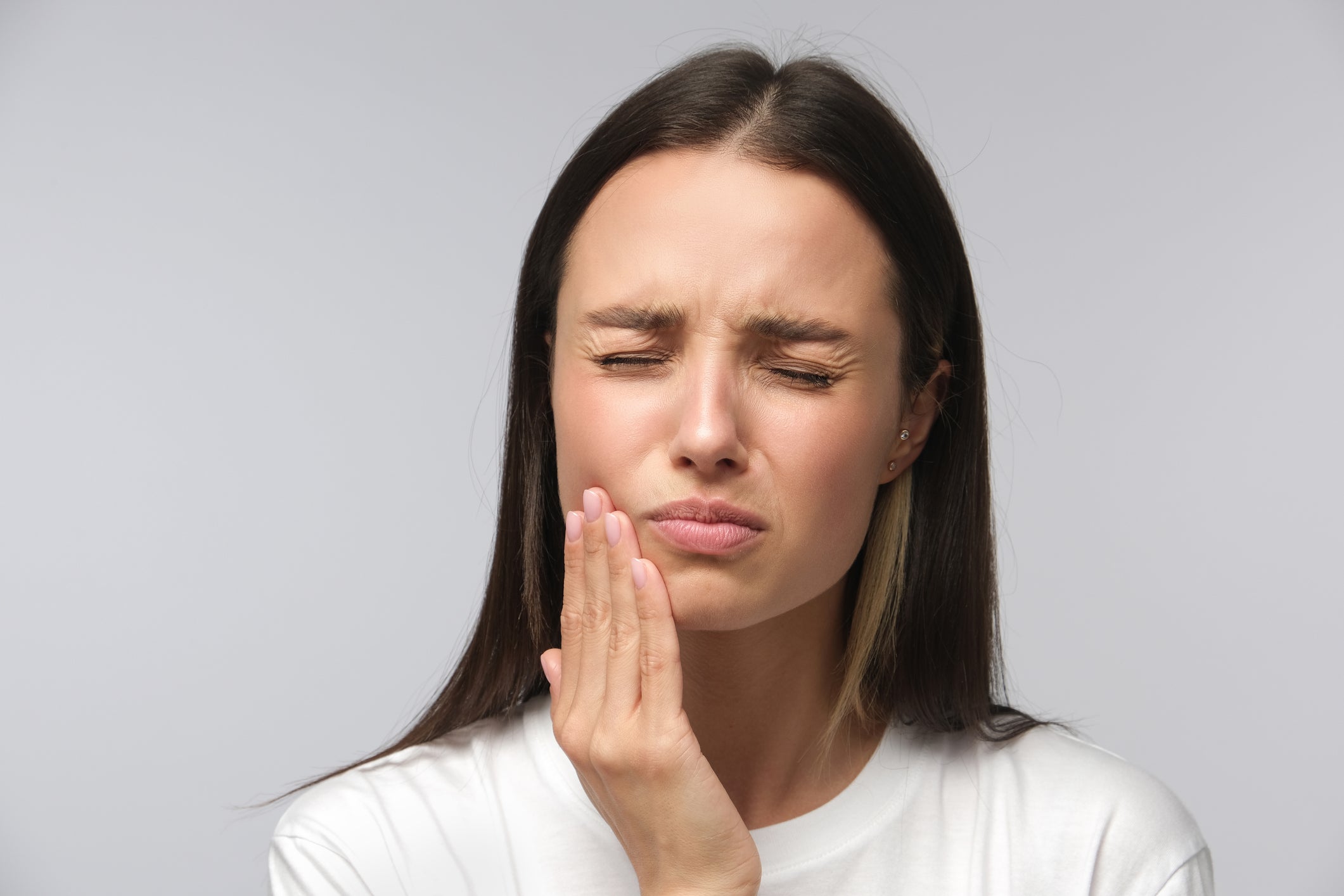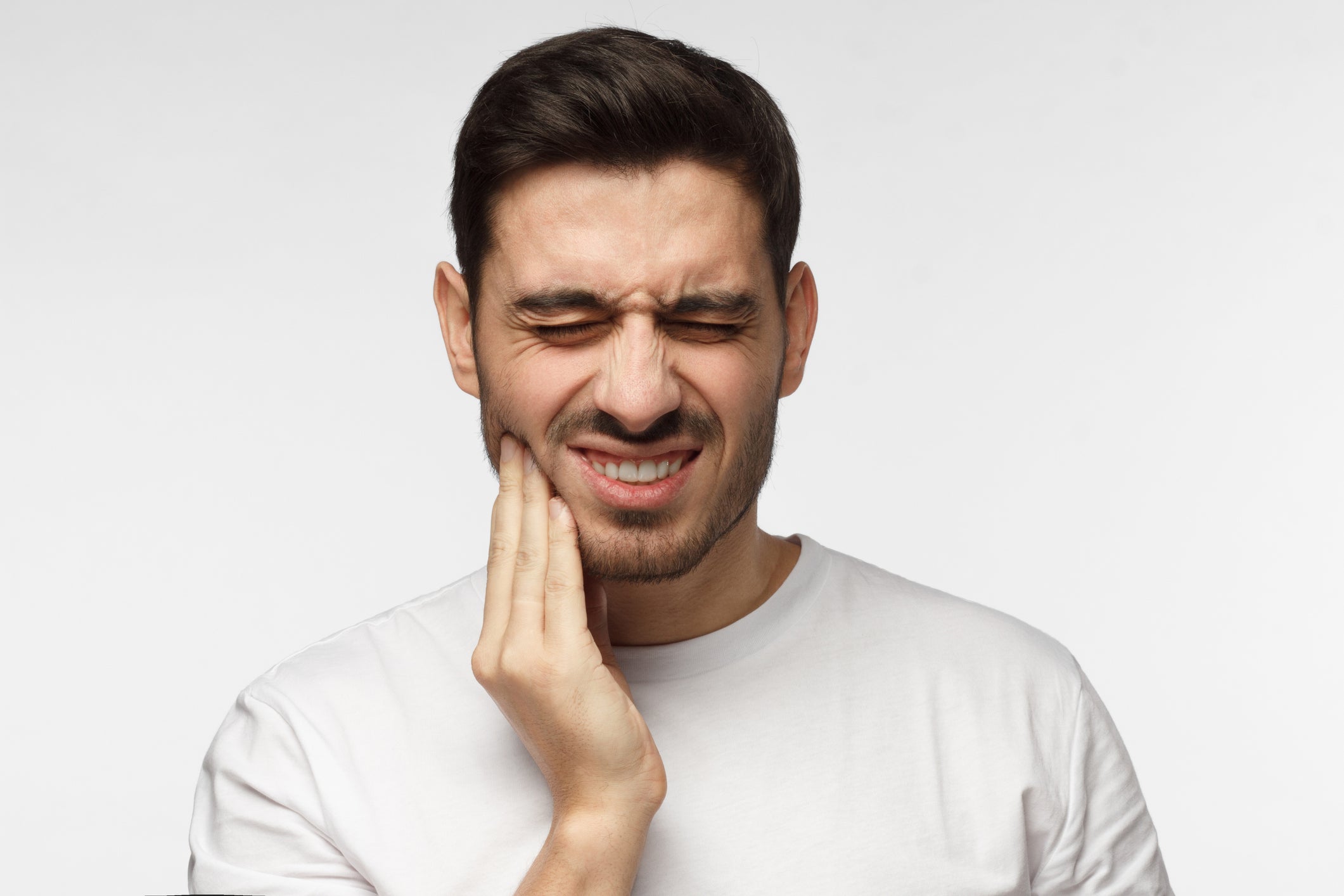-
10 Ways Stress Can Impact Your Teeth

You know that stress can manifest as a headache, muscle tension, or high blood pressure, but have you ever considered how stress can impact your teeth? Here are 10 of the most commonly reported dental health issues linked to stress.
- Tooth grinding: Also known as bruxism, nighttime tooth grinding is a common condition, especially among stressed individuals. The unconscious habit wears down your teeth over time and may also cause tooth shifting and jaw pain.
- Tooth fractures: Teeth have tiny fissures in them due to everyday wear and tear. As long as they don’t become any worse, these fissures are no problem. Unfortunately, jaw clenching and stress go hand-in-hand, causing weak teeth to eventually fracture and break.
- Sensitivity: Nighttime grinding and daytime clenching can wear down the protective enamel layer, leaving your teeth more sensitive to hot and cold temperatures and sweet and sour foods.
- Temporomandibular joint (TMJ) pain: The TMJ is the joint connecting each side of your jaw to your skull. Pain or dysfunction in this joint is known as temporomandibular joint disorder, or TMD. Stress-related tooth grinding, jaw clenching, and muscle tension may cause or aggravate TMD.
- Gum disease: Some studies suggest a link between the stress hormone cortisol and bacterial growth that leads to gum disease, also called periodontal disease. This chronic oral health problem can cause gum sensitivity, bad breath, and eventually tooth loss.
- Cold sores: Also called fever blisters, cold sores are caused by the herpes simplex virus. Being upset or stressed can trigger an outbreak at the corners of your mouth, which may take a week or more to clear up.
- Canker sores: These painful mouth sores make it difficult to eat spicy, salty, or acidic foods. Experts aren’t sure what causes canker sores, also called recurrent aphthous stomatitis (RAS), but it appears that stress increases your risk.
- Oral infections: Stress negatively impacts your immune system, making you more vulnerable to low-grade infections in your mouth and elsewhere in your body.
- Dry mouth: Formally known as xerostomia, dry mouth is when your salivary glands fail to produce enough saliva. Among other causes, stress and anxiety have been shown to decrease saliva production, causing dry mouth.
- Bad oral health habits: Stressed-out people are often exhausted or pressed for time, making them more likely to neglect their oral health, as well as rely on cigarettes, alcohol, and unhealthy comfort food. All of these habits increase the risk of cavities, gum disease, and other concerns.
Don’t allow stress to wreak havoc on your dental health! Instead, take steps in your daily life to reduce anxiety, such as meditating, doing yoga, and working on your time management skills. Then, fit dentist visits into your busy schedule to keep on top of oral health problems as they arise. To work with the best dentist in New York, contact Park 56 Dental at (212) 826-2322. We have served patients in the 10022 zip code area for over 20 years.
-
What to Expect During Your First Visit to Park 56 Dental

At Park 56 Dental, we are committed to providing our patients with safe, gentle, high-quality dental care. We understand that you or your child may feel apprehensive about your first visit to our office. That’s why we’ll do everything we can to not only make you feel comfortable but truly pampered during your time with us. Here’s what to expect when you visit Park 56 Dental in NYC for the first time.
Review Your Dental & Medical History
Our first goal during your dental consultation is to understand your health. We will review any records you have from previous dentists, along with the patient information form we ask you to complete. Be sure to provide as much information as possible to accurately convey your health status.
Also, don’t forget to bring your insurance card so you can take advantage of your dental benefits when paying for services. This is also a good time to discuss any dental anxiety you have. Sedation dentistry could be a good option for you, depending on your needs.
Take Digital X-Rays
The next step is to have a closer look at your teeth and gums by taking X-rays. The digital imaging technology we use decreases radiation exposure by 90%, ensuring your safety while also making images available for immediate review. Your X-rays serve as a baseline for your current dental health and help us recommend immediate and long-term treatment options.
Clean and Polish Your Teeth
With digital imaging complete, it’s time to clean your teeth. Here’s what this entails:
- Physical exam: A dental hygienist checks your teeth and gums for signs of gingivitis. If major problems are detected, the hygienist might call in the dentist to make sure it’s okay to proceed with the cleaning.
- Plaque and tartar removal: Using a small mirror to check all surfaces, your hygienist removes plaque and tartar buildup from your teeth. This may involve scraping and spraying your teeth with a high-pressure water jet.
- Polishing: The hygienist polishes and removes stains from your teeth using a gritty paste.
- Flossing and rinsing: The hygienist touches up your smile by flossing and rinsing with water.
- Fluoride treatment: An optional fluoride gel at the end of your cleaning helps protect your teeth against cavities until your next dentist appointment.
Meet with the Dentist
Following a comprehensive teeth cleaning, your dentist will sit down with you to review the findings and discuss any immediate treatment needs. This is your chance to ask questions and discuss any cosmetic dentistry services you’re interested in, including veneers, tooth reshaping, whitening, and more.
Everyone’s busy, but regular dental checkups are an important part of maintaining a healthy smile! In fact, the American Dental Association recommends visiting the dentist every six months. If it’s been longer than this since your last visit, contact Park 56 Dental at (212) 826-2322 to schedule your first appointment with NYC’s best dentist. We have over 20 years of experience serving patients in the 10022 zip code area.
-
The Best and Worst Thanksgiving Foods for Your Teeth

When you go to plan your Thanksgiving dinner menu, how do you decide what to serve? Most people opt for traditional family favorites, perhaps with a new dish or two to try. But if you or someone in your family is struggling with oral health issues, it may be wise to choose foods based on how good they are for your teeth and gums. Here are some of the best and worst foods to eat for Thanksgiving if you’re focused on good oral health.
Limit These Worst Thanksgiving Foods for Your Teeth
- Stuffing and rolls: They may be Thanksgiving staples, but the sugary carbohydrates in stuffing and rolls feed the bacteria in your mouth. The acids left behind can then erode your teeth and lead to cavities.
- Cranberry sauce: Loaded with sugar and tooth-staining berries, cranberry sauce is known to discolor enamel and encourage cavities to form.
- Pies and desserts: Most people enjoy a slice of pumpkin or pecan pie and other desserts after Thanksgiving dinner. Keep in mind that sugar turns into acid in your mouth, making it your teeth’s worst enemy.
- Caramel corn: Popcorn is bad enough, but cover it with sticky caramel, and you have a recipe for dislodged crowns and lost fillings.
- Alcohol: The acid in wine is enough to etch your teeth if you drink it too often, so be wise about your alcohol consumption this Thanksgiving.
If you must indulge in these Thanksgiving foods, do so sparingly. Then, to remove particles from your mouth, rinse with water throughout the meal and brush your teeth 30 minutes after your last bite.
Eat More of These Best Thanksgiving Foods for Your Teeth
- Turkey: Good news—the quintessential Thanksgiving food is perfectly fine for your teeth! Turkey doesn’t contain starch or sugar that can harm your oral health, and it’s also an excellent source of vitamin D and protein to support a healthy smile.
- Vegetables: Carrots, celery, cucumbers, and tomatoes are a healthy addition to your Thanksgiving feast. Veggies are chockfull of vitamins and nutrients that promote good oral health. The act of chewing them also scrubs your teeth, massages your gums, and stimulates saliva flow.
- Sweet potatoes: Feel free to load your plate with sweet potatoes because they’re high in potassium, dietary fiber, and vitamin B6. Just be careful about the brown sugar or marshmallows often served with them.
- Cheese and nuts: Munch on these snacks guilt-free, knowing they’re filled with calcium, protein, and other nutrients your teeth need to stay healthy and strong.
If you notice stained, yellowed, or aching teeth around the holidays, don’t put off visiting the dentist. A trip to Park 56 Dental will leave your teeth feeling cleaner and brighter. Voted NYC’s best dentist, we are well-equipped to meet all your preventative and restorative dentistry needs. Give us a call at (212) 826-2322 to set up an appointment today! We have been serving patients in the 10022 zip code area since 1997.
-
How to Reverse Cavities

No one wants to hear their dentist say, “You have a cavity.” The key to good oral health and a cavity-free mouth is to understand why cavities form so you can take steps to prevent and reverse them.
What Causes Cavities?
Cavities are the result of untreated tooth decay, which occurs when your teeth are repeatedly exposed to acid and bacteria. Your diet and oral care routine play a significant role in the formation of cavities. When you eat sugary or starchy foods, a sticky substance called plaque forms on your teeth. The bacteria in your mouth feed on this plaque, producing acid as a waste product. This acid then eats away at your teeth.
Tooth decay occurs in five stages:
- Demineralization: Your teeth lose and regain minerals all day long. The problem occurs when depleted minerals are not restored.
- Enamel decay: The outer layer of your teeth decays first.
- Dentin decay: As the problem spreads to the dentin layer, you may start to feel pain.
- Pulp decay: Pain and inflammation can become severe if decay reaches the inner pulp of your teeth.
- Abscesses: When bacteria inside a cavity spread beneath the pulp, a pocket of pus can form, causing a painful abscess.
Signs of Cavities
Watch out for these signs that your teeth are starting to decay:
- White spots on your teeth (a sign of mineral loss)
- Grey, black, or brown spots on your teeth (a sign of decay)
- Toothaches
- Painful chewing
- Sensitivity to hot, cold, or sweet substances
- Pits or holes in your teeth (detectable through an X-ray)
How to Prevent and Reverse Cavities
By the time a cavity is noticeable, it may be too late to reverse the damage naturally. However, with the proper care, you can prevent cavities and even help early tooth decay heal on its own. Here’s what to do:
- Improve your nutrition: Replace sugary, starchy, and acidic foods with those rich in calcium, vitamins B and D, magnesium, and iron.
- Keep up your oral care routine: Remove bacteria-feeding plaque from your mouth by brushing your teeth morning and night, flossing at least once a day, and rinsing with mouthwash.
- Remineralize your teeth: Fluoride is the key to preventing mineral loss and replacing lost minerals. You can get fluoride from toothpaste, mouthwash, tap water, prescription fluoride tablets, and in-office fluoride treatments.
- Visit the dentist every six months: Dentists help prevent cavities by providing routine checkups and cleanings. They can also reverse cavities with fillings, crowns, root canals, and implants. These dental restorations are usually covered by insurance.
To keep your mouth cavity-free, be sure to visit Park 56 Dental, the best dentist in New York. We have more than 20 years of experience pampering our patients in a spa-like setting. For more oral care tips or to schedule a free consultation with our NYC dentist, please call us at (212) 826-2322 or contact us online.
-
How to Prevent Cracking Your Teeth

Your bite produces massive amounts of pressure, as much as 5,600 pounds per square inch. Teeth structure is amazingly resistant to this pressure and able to withstand a compressive force of approximately 30,000 pounds. But when you introduce foods and non-foods that are excessively hard, teeth can crack under the pressure. Tiny cracks in your teeth can put you at risk for deeper, more serious cracks and the introduction of dangerous bacteria into the tooth openings. Learn how to prevent cracks in your teeth so you can safeguard your smile for years to come!
Abstain from Foods that Could Injure Your Teeth
While teeth can withstand some tremendous forces, avoid adding extra stress by using them in proper ways. One of the most common ways teeth are damaged are from the foods and non-foods you eat or chew on. Common culprits for teeth cracks include:
- Ice
- Popcorn
- Frozen foods
- Hard candies
- Pens or pencils
If any of these foods or non-foods are a part of your daily routine, consider making some changes to protect your oral health.
Get Treatment for Teeth Grinding or Clenching
Twenty percent of Americans grind their teeth, a condition called bruxism, which is often accompanied by teeth clenching as well. Most people aren’t conscious of this stress-induced condition since it often occurs while they are sleeping. If teeth grinding isn’t treated it can lead to chips, breaks, and cracks in teeth overtime. A custom nightguard by your dentist can help treat the effects of teeth grinding.
Wear a Sports Mouthguard During Athletic Activities
Athletes are also at risk for teeth cracks from impact injuries during activities. The American Academy of Pediatric Dentistry reports that only 22 percent of children wear mouthguards while playing sports. A sports mouthguard can protect teeth from this dangerous source of oral trauma.
Park 56 Dental offers restorative dentistry to repair and prevent cracks in your teeth so cracks don’t jeopardize the health of a tooth or adjacent teeth. Contact us today at (646) 679-3989 if you have any questions about the stability of your teeth. Your health and well-being are our top priority
-
How Your Teeth Impacts the Rest of Your Face

Facial symmetry is a leading factor in what makes you look like you. Maximizing the symmetry of your face not only makes you look better, it makes you feel better as all the interior structures of your mouth and jaw coordinate together. This delicate balance of teeth and jaw functionality depends on the health of your teeth. Learn how missing teeth affect the shape of your face to motivate you in your efforts for professional preventive dental care and proper oral hygiene.
Teeth Shape and Health Make a Big First Impression
Teeth shape and health are felt on a physical and emotional level. How you feel about your smile directly influences your self-esteem. Missing teeth makes eating challenging while also affecting the health of your jaw.
Teeth Affect Face Shape and Symmetry
Teeth support the length of the face and the anatomy of the jawbone. Shorter teeth from frequent tooth grinding can trigger facial asymmetry. A collapsing bite propels the jaw forward resulting in a sunken, hollow facial appearance.
Shifting teeth can cause a once symmetrical smile to become uneven. These shifts can shorten the length of the face and lead to a deeper bite.
Abscessed Teeth Can Affect Your Sinuses and Trigger Bone Loss
The roots of your molars are separated from your maxillary sinuses by extremely thin bone. Infected teeth and gums can spread infection into your sinuses through this pathway, impacting your entire face. Although rare, abscessing teeth can destroy facial bones. If bone health is compromised, bone strength and size is reduced which affects your overall facial aesthetic.
Missing Teeth Can Cause the Face to Cave In
While having a single missing tooth won’t alter your appearance much, it can lead to teeth shifts and changes which directly affect your facial structure. Teeth uphold the shape of your face by:
- Supporting jaw alignment.
- Maintaining facial balance.
- Preventing bone deterioration and jaw atrophy.
- Preserving lip shape by buoying the surrounding muscles.
- Averting jaw fractures and tooth loss from jaw weakness.
Teeth prevent your jaw from shrinking in size. They separate the two jawbones and add length to your face. Teeth roots stimulate the jawbone when you chew. When teeth are missing, the bone of the jawbone doesn’t get exercised properly causing it to disintegrate and atrophy. The lack of the former bone size causes the face to take on a recessed, shriveled appearance.
If you need help bettering your dental health and filling gaps in your smile the dentists at Park 56 Dental have the expertise you require. Contact us today at (646) 679-3989 to learn about your options with cosmetic, restorative, or general dentistry.
-
Dental Emergency: What to Do When a Tooth Gets Knocked Out

Did you know that more than five million teeth are knocked out every year in children and adults? If this happens to one of your loved ones, don’t worry! Quick action can improve your odds of saving the tooth.
Causes of Knocked Out Teeth
Teeth get knocked out for various reasons that all involve an impact to the face. Most often, a tooth becomes knocked out during a contact sport when the participant failed to wear a mouthguard. The most common ways that teeth get knocked out include:
- Sports injuries
- Car accidents
- A fight
- Tripping or falling
Sports-related oral trauma ranges from a chipped tooth to having a tooth completely knocked out. By taking quick action, caretakers can make a big difference on salvaging the damage.
Preserving a Knocked-Out Tooth
Many are unaware that a tooth can be saved even if it is knocked out. Learn what to do immediately after a tooth is knocked out so you can restore your prior smile’s beauty. The following steps are recommended by the American Association of Endodontists to save a tooth that has been knocked out:
- Delicately pick up the lost tooth by the crown (also known as the chewing surface.)
- Use water to rinse the tooth. Only water, nothing else.
- Gently replace the tooth in the original socket at once. Keep it in place with your fingers or by biting down softly.
- Keep the tooth moist in your mouth. If it won’t stay in the socket, place in next to your cheek in your mouth, or in a small container of milk.
- Visit your dentist, endodontist, or emergency department within 30 minutes of the accident. (Some teeth can still be saved if it has been outside the mouth for more than hour but contact your dental provider for specific instructions.)
In the dentist’s office or emergency department, the tooth will either be re-implanted or splinted to the nearby teeth for a period of two-eight weeks. A root canal procedure will be needed for long-term survival of the tooth.
Other Reasons a Tooth May Fall Out
If you lose a tooth due to periodontal disease, the steps listed above will not save the tooth. Prevent this type of tooth loss by proactively visiting your dentist every six months and performing the proper oral care steps at home.
Park 56 Dental offers same-day emergency appointments to get you the critical care you need when a tooth is knocked out. We understand that dental injuries require immediate, personalized care to put your mind at ease and to restore your smile.
Contact us today at (646) 679-3989 if you have any questions about a dental emergency or what to do. Your safety and well-being are our first priority!
-
Why You Should Consider Sedation Dentistry

Sedation Dentistry is an Essential Part of Dedicated Dental Care
A positive patient experience is an important part of excellent dental care. Fear of the dentist prevents too many from taking care of their teeth in a timely manner. Dentists are dedicated to helping their patients feel welcome, comfortable, and enthusiastic about improved oral health and aesthetics through sedation dentistry techniques. Sedation dentistry can eliminate fear before or during treatment!
By the Numbers
An estimated 30% of adults avoid the dentist due to fear. That’s a lot! For many people, they could be suffering needlessly from oral diseases despite modern technological advances that offer them relief and comfort with their dental health care needs. But researchers estimate 75 million US citizens don’t seek dental care that can easily be treated by conscious sedation dentistry or general anesthesia.
What is Sedation Dentistry?
Many people refer to sedation dentistry as “sleep dentistry” but the nickname is inaccurate since the patient does not actually sleep during treatment. Sedation dentistry is a form of dental treatment that significantly reduces pain and makes procedures easier to tolerate.
This process usually involves giving patients time-release injections or intravenous anesthesia, so they can relax during their procedure without being bothered by the sight or sound in any way.
Eight Benefits of Sedation Dentistry
Sedation dentistry is a great option for patients who are afraid or anxious about visiting the dentist. It allows them to receive routine oral care without feeling threatened. It allows their minds to relax during procedures while under close supervision from providers trained in sedation techniques.
Studies have shown that this form of treatment often results in less treatment time compared to those not under sedation. Other benefits of sedation dentistry include:
- Makes the appointment time go by faster.
- Reduces your dental anxiety during and before treatment.
- Encourages you to make your preventive appointments.
- Reduces the strength of your gag reflex.
- Minimizes pain during treatment.
- Helps you sit still for longer procedures.
- Improves your overall health as you better your oral health.
- Offers different strengths of sedation dentistry for ultimate comfort.
Park 56 Dental is IV-certified and licensed by the American Dental Association to deliver sedation dentistry. Our specialty training by the State Board of Dental Examiners allows us to administer controlled medications to foster a comfortable, pain-free experience.
Contact us today at (646) 679-3989 to learn the type of sedation dentistry that is best for you.
-
How to Care for Yourself After a Dental Procedure

Root canals, tooth extractions, and dental implants are common smile restorations that require some recovery time. Choosing an experienced oral surgeon is the first step toward ensuring a comfortable recovery.
At Park 56 Dental, we offer sedation dentistry to make your time in the dentist’s chair as comfortable as possible. We also review the recommended aftercare with you before you undergo any procedure, so you know exactly what to expect during your recovery. And if you have any urgent questions for us, rest assured that we answer emergency calls 24 hours a day.
Here are some general aftercare tips we recommend to take care of yourself after a dental procedure.
- Take it easy: Take time off school or work and rest at home. Avoid physical exertion for two to three days, and keep your head propped up with pillows to reduce inflammation.
- Apply ice packs: Ice helps to numb any localized pain and brings the swelling down. Throughout the first recovery day, apply a towel-wrapped ice pack for 15 minutes on, 15 minutes off.
- Leave gauze pads in place: Wait for three or four hours to remove any gauze pads your oral surgeon put in your mouth. This helps minimize bleeding and helps the surgical area clot properly.
- Eat soft food: Stick to a liquid or soft-food diet for a few days. Chilled soup, mashed potatoes, scrambled eggs, yogurt, smoothies, milkshakes, and ice cream are all good options.
- Avoid hot foods and drinks: Wait until the local anesthesia wears off completely to eat or drink anything hot so you don’t accidentally burn your tongue or the roof of your mouth.
- Don’t drink through a straw: Suction in the mouth can dislodge the blood clot from the treated area, leading to a painful condition called dry socket. To prevent this, don’t drink from a straw for three days after oral surgery.
- Take medication: Over-the-counter pain relievers can help make your recovery more comfortable. If your oral surgeon prescribes antibiotics, take those as directed as well.
- Rinse with salt water: 24 hours after your procedure, rinse gently with warm saltwater. A good ratio is one-half teaspoon salt per one-half cup of water. Rinse after every meal and snack to help remove food particles from around the surgical area.
- Brush carefully: Avoid brushing the treated area until it has fully healed, but continue to brush the rest of your teeth.
- Don’t smoke or drink alcohol: These habits can interfere with the healing process, so avoid them for at least 24 hours. Better yet, quit smoking and always limit your alcohol intake to improve your overall health.
If you’re looking for skilled dental care and oral surgery in NYC, you’ve come to the right place. Park 56 Dental has been voted NYC’s best dentist, so why would you go anywhere else for your next dental procedure? To learn more about our services, please call us at (212) 826-2322 or contact us online today.
-
How to Prevent Gum Recession

Receding gums are a common oral health problem. You know your gums are receding if you have less gum tissue than you used to and your teeth look longer than normal. What you’re seeing is the exposed tooth root, which may be sensitive to hot and cold temperatures. Gum tissue doesn’t grow back, so it’s important to prevent gum recession before it’s too late.
- Brush your teeth gently: It’s a misconception that the more aggressively you brush, the cleaner your teeth become. Not only does vigorous brushing wear down tooth enamel, but it also irritates your gums. Switch to a soft-bristled toothbrush, and be careful about how much pressure you use when brushing each morning and night.
- Floss daily: Flossing targets the hard-to-reach places between your teeth and along the gum line. Scraping away plaque and stubborn food particles from these areas is critical to keep your gums healthy and prevent them from receding.
- Stop smoking: Tobacco use of any kind is horrible for your oral health. It leaves a sticky film in your mouth that can cause gum recession if not removed thoroughly. Stop smoking to promote gum health, prevent tooth stains, and reduce the risk of oral cancer.
- Eat a nutritious diet: Gum tissue, like the rest of your body, needs adequate vitamins and minerals for optimum health. Some of the best foods for a healthy smile include apples, carrots, leafy greens, plain yogurt, and almonds.
- Wear a mouthguard: Do you grind your teeth at night? If you’re not sure, your dentist can diagnose this condition, known as bruxism. Then, you can look into getting a custom mouthguard to protect your teeth and gums while you sleep.
- Straighten your smile: Crooked teeth and a misaligned bite place excess pressure on your jawbone and gums, making gum recession more likely. Invisalign is the invisible way to straighten your teeth and keep your gums healthy.
- Avoid mouth piercings: Lip and tongue rings are a surefire way to irritate your gums and cause them to recede. So play it safe and stick to ear piercings to keep your mouth free of foreign objects.
- Visit the dentist: The American Dental Association recommends that most people visit the dentist every six months for a checkup and cleaning. During your exam, a hygienist will remove tartar and plaque from your teeth that can irritate the gums. Your dentist will also check for signs of recession and offer personalized tips to prevent the problem from getting any worse.
If you notice receding gums or other signs of gum disease, reach out to Park 56 Dental. We’ve been voted the best dentist in NYC, so you can rest assured that our team will take great care of you. We offer effective treatments to help slow or even reverse gum disease and recession, including root planing and scaling, flap surgery, and bone and tissue grafts. To learn more, please call us at (212) 826-2322 or contact us online today.
RECENT POSTS
categories
- Uncategorized
- Cosmetic Dentistry
- Veneers
- Healthier Teeth
- Teeth Whitening
- Dental Health
- Video
- Dental Emergencies
- Invisalign
- Dental Implants
- Root Canal
- Sedation Dentistry
- Infographic
- Dental Crowns and Bridges
- Dental Anxiety
- Gum Disease
- COVID-19
- Bad Breath
- New York Dentist
- Cut out sugar
- General Dentistry
- Oral Health
- Oral Cancer
- Dry Mouth
- Gum Health
- Toothache
- Dental Sealants
- Cavities
